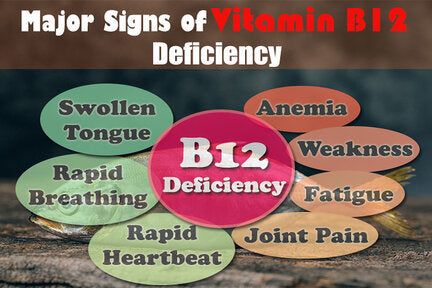B12 deficiency: Signs, symptoms, and how to increase your levels

B12 is a powerful vitamin that creates DNA and keeps the cells within our nervous and cardiovascular systems at optimal function. Being low in B12 could explain why you've been feeling tired and weak.
As amazing as our bodies are, B12 isn't a nutrient that can be sourced on its own, we must get it from our food or supplements. Important to note: B12 deficiency is common in the general population with about 15% of people deficient in the nutrient
In addition, a massive 92% of vegans can run the risk of being deficient. So, could it be the reason why you've been feeling sluggish?
Tell-tale signs of B12 deficiency
Those at the highest risk of a B12 deficiency are the elderly, people who've had recent bowel surgery, strict vegans, and those taking either metformin or antacid drugs. But that's not to say you're immune from this deficiency in the general population either.
The most common signs of B12 deficiency over a sustained period are:
- Pale or yellowing skin
- Pins and needles sensations
- Mouth ulcers
- Dizziness
- Weakness and tiredness
- Blurred vision
- Mood changes
- Change in mobility balance or coordination
- Running at a high temperature (rare)
For a small vitamin, a deficiency can really disrupt your life. Fortunately, it's not difficult to source more.
What this deficiency will do to your body
B12 affects the nervous system and the cardiovascular system. To be blunt, you need B12 for healthy cells.
Without it, you'll suffer all the signs of low B12 - listed above. This essential vitamin helps to support the DNA required for our red blood cells.
When cells become nutrient deprived, they are unable to divide properly meaning that you'll feel tired, weak and it causes your skin to yellow. Incorrect blood cell production will cause inefficient oxygen transportation.
Remeber, oxygen is what gives our body life. Have you ever noticed that you feel better after a long, deep breath? That's because reduced oxygen transportation will produce a more tired, dizzy, and breathless you. Exactly not what you wanted alongside a busy schedule.
Vitamin deficiencies also wreaks havoc on the nervous system. In fact, prolonged B12 deficiency can cause long-term effects on your nerves including unexplainable "pins and needles."
This is because your body can't produce a protective sheath called myelin properly. With this nervous system impairment, you're more likely to struggle with balance and coordination - a deadly combination for the elderly.
And no one is immune to the mood shifts such as depression, anxiety, and even dementia that it can contribute to. With all of these evidence-based issues, you should be concerned about your B12 levels.
How to get more B12 into your diet
Being aware of your B12 levels is a necessity for optimum health and vitality. With 15% of the population deficient, someone that you know is probably low in this nutrient.
Generally speaking, men need 2.4 mcg per day, and women will need 2.6 mcg per day. If you eat animal products, B12 naturally occurs in many animal-based products including dairy, fish, poultry, and red meats.
Seafood products can offer you the most B12, by far!
Although vegans seem to receive a lot of community concern over their protein levels, the popular macronutrient is not something they should be worried about. Simply have your vegan friends supplement with B12.
In this day and age, where so many of our foods are modified to keep up with our consumption, supplementation is always the best course when you're low in a vitamin or mineral. If you think you have a vitamin B12 deficiency, eat organic animal products, or supplement your B12 today.
Sources for this article include:






